Spotlight
- Mert Yakup Baykan / Department of Aerospace Engineering, Undergraduate Intern at Combustion Modeling Lab
- 관리자 |
- 2025-04-01 09:35:45|
- 55
- 2025-04-01 09:35:45|
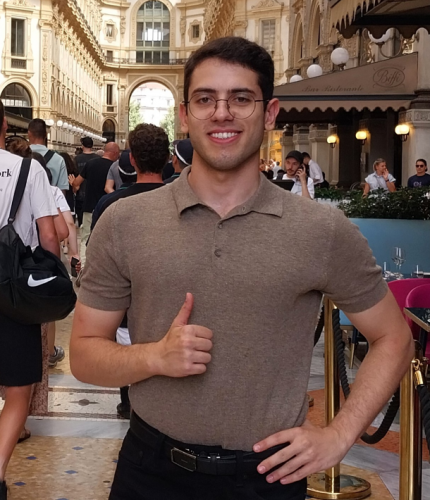
Department of Aerospace Engineering, Undergraduate Intern at Combustion Modeling Lab
Combustion Modeling
I am Mert Yakup Baykan, coming from Cyprus, a Mediterranean island blessed with stunning beaches and endless sunshine. Growing up in such a relaxed place gave me plenty of time to ponder my future. At night, I used to gaze up at the moon and stars, dreaming of what it might be like to journey into space. Those moments sparked my ambition to become an astronaut. To excel in that dream, I knew that I would first need to have a strong foundation in aerospace engineering. That is why I enrolled at KAIST in the fall of 2021, where I am now wrapping up the final year of my bachelor’s degree.
Q) Could you introduce yourself?
A) I am Mert Yakup Baykan, coming from Cyprus, a Mediterranean island blessed with stunning beaches and endless sunshine. Growing up in such a relaxed place gave me plenty of time to ponder my future. At night, I used to gaze up at the moon and stars, dreaming of what it might be like to journey into space. Those moments sparked my ambition to become an astronaut. To excel in that dream, I knew that I would first need to have a strong foundation in aerospace engineering. That is why I enrolled at KAIST in the fall of 2021, where I am now wrapping up the final year of my bachelor’s degree.
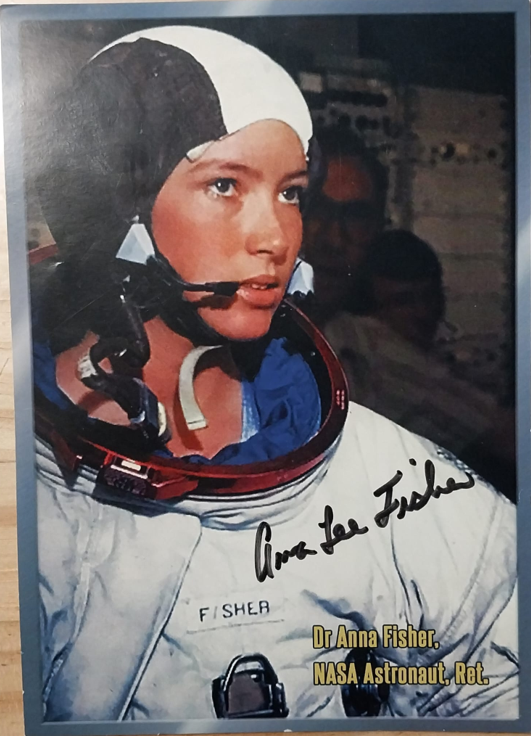
An autographed photo of Astronaut Anna Lee Fisher, given to me when she visited Cyprus, 2019.
Q) What is your research about?
A) Amongst everything engineering-related, rockets and their engines fascinated me–a huge amount of force controlled with precision to launch humans toward the stars. On top of that, I was into programming, so I joined the Combustion Modeling Lab of Professor Shin as an undergraduate intern. Initially, I tackled a variety of small tasks and worked on optimizing a CFD solver on the supercomputer Nurion. I got to present my research as a poster at the 14th Asia-Pacific Conference on Combustion (ASPACC) held in Taiwan. Additionally, my hard work until that point was recognized when I was selected as a KAIST Presidential Fellow (KPF) in 2024 receiving 10 million KRW support to attend conferences and educational events abroad.
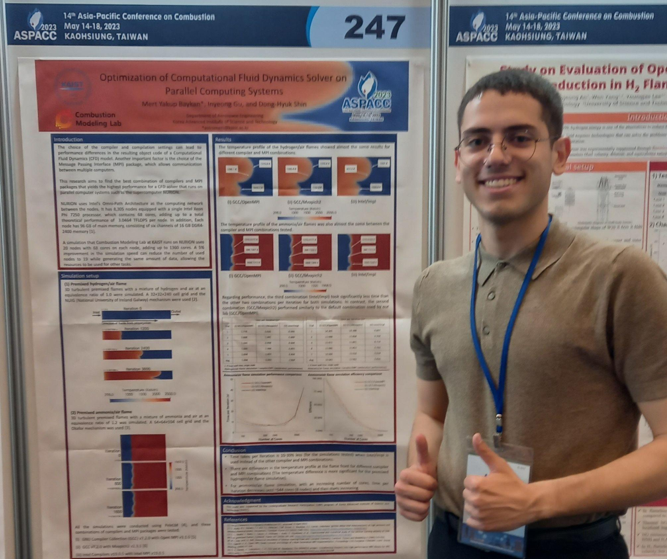
14th Asia-Pacific Conference on Combustion, Kaohsiung, Taiwan, 2023.
Following that my main focus has been investigating the potential use of machine learning models for reactive flow simulations. I have been working on accelerating the source term computations of chemical reactions by using a novel machine-learning model developed by KAUST to reduce numerical stiffness. We started collaborating with Professor Hong G. Im’s group at KAUST in early 2024 and I implemented a new training method that allowed the ML model to learn ignition phenomena for various pressures. I presented these results as another poster presentation at the 40th International Symposium on Combustion (ISOC) in Milan, Italy. Following this, for the fall semester of 2024, I was selected for the visiting student research program (VSRP) at KAUST in Saudi Arabia which covers the entire expenses for 6 months, and I worked on implementing another training method which led to better extrapolation performance for the models and thus increased robustness. I got the chance to present these findings as oral presentations at the 21st International Conference of Flow Dynamics (ICFD) in Sendai, Japan, and AIAA Sci-tech 2025 in Florida, USA. I learned a lot from attending these conferences and got the chance to connect with many scholars from all around the world.
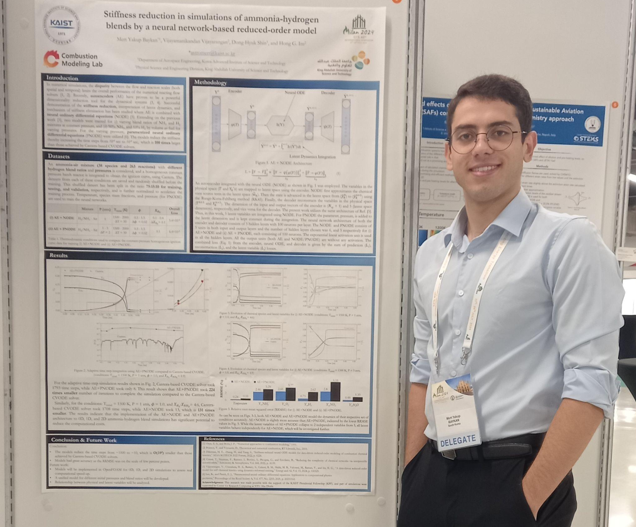
40th International Symposium on Combustion, Milan, Italy, 2024.
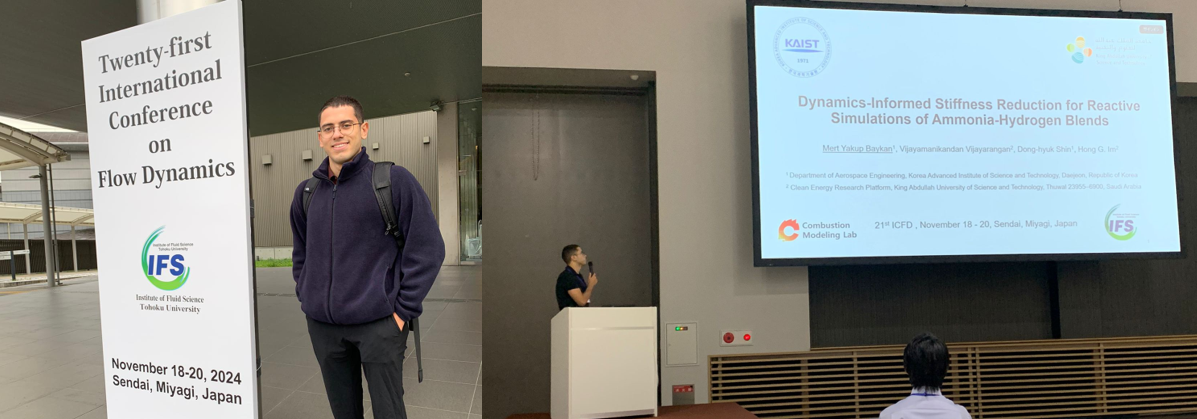
21st International Conference on Flow Dynamics, Sendai, Japan, 2024.
All of these collaborations and research opportunities would not be possible without the support of Professor Shin, AE department, and KAIST. So, I am grateful to have had these opportunities to gain so much experience as an undergraduate student.
My message for junior aerospace engineering students:
In addition to the research opportunities, the classes in KAIST AE help students grow. Last year, in my System Design I course, my team of four was working on designing an aircraft to solve a specific problem as part of the final project. At first, it felt overwhelming, but we poured countless hours into it—diving into books, digging through documents, and brainstorming ways to craft a plane best suited to our goal. By the end of the semester, when we finalized the design and ran the flight simulation, successfully achieving our goal, I truly felt like an engineer for the first time. That feeling was incredible.
There were so many similar moments throughout my journey at KAIST AE. All of the challenges eventually paid off. So, if aerospace engineering is your passion, stick with it. The effort and persistence will be worth it in the end, and KAIST provides all the opportunities required to achieve your dreams.
| Attach File |
|---|

